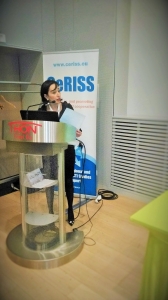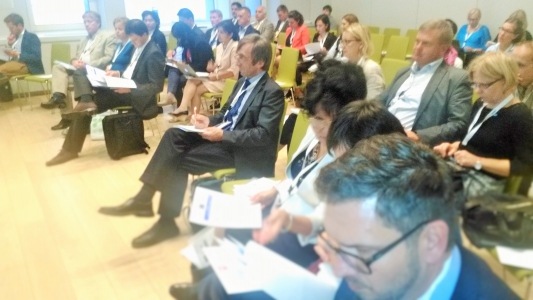News
Workshop on the State of Affairs & Future of EU-Central Asia STI Cooperation, Brussels, 3 September 2015
CeRISS organized a workshop on the State of affairs and future of EU-Central Asia Science, Technology and Innovation (STI) Cooperation on 3 September 2015, in Brussels. The workshop was funded under the FP7 IncoNet CA project.
The event has taken place at the beginning of the third and last year of the IncoNet CA project targeting the STI cooperation with the Central Asia countries and marks a critical moment for the participation of these countries in Horizon 2020 and, in particular, the new Work Programme for 2016-2017.
The event involved 47 key stakeholders from both the EU and the Central Asia countries, i.e. European Commission, EU/MS & CA national representatives, IGLO members, NCPs, representatives of other funding initiatives as well as IncoNet CA consortium partners, triggering in-depth discussions related to the state of affairs of EU-CA cooperation as well as challenges for the future and how these could be settled in a most efficient way.
The workshop consisted of three main sessions. The first session was dedicated to the STI cooperation on the three Societal Challenges of Climate Change, Energy & Health and the new Work Programme of Horizon 2020 (2016-2017). Results of the IncoNet CA project on these societal challenges were presented (co-publication analysis; twinning grants; benchmarking exercise for energy institutes), while a brief introduction of the broad directions of the new WP on these 3 societal challenges was presented.
The second session was entitled Opportunities for future EU-CA STI Cooperation through research, innovation & business. In this session, the Policy Mix Review of the STI system of Kyrgyzstan, organized by IncoNet CA, was presented as a tool for reforms in CA. Moreover, opportunities for EU researchers in Central Asia countries were discussed, while the role of KICs and their structure were presented in detail. The new role of ISTC in Central Asia was presented along with opportunities for cooperation with Horizon 2020. The innovation policies of Uzbekistan and the role of the Centre for Higher Technologies were introducted along with opportunities for cooperation with the EU. Finally, the important challenges of addressing water problems in Central Asia were presented with emphasis on how these could be solved by making synergies with the EU.
The last session was a roundtable discussion under the topic How to enhance CA countries' R&I cooperation with the EU in Horizon 2020 and beyond. Issues that dominated the discussion among the panel and the audience were related to the low participation of the CA countries in H2020, the needs of the STI system of the region and how the EU could support it, and the readiness of CA countries to provide "incentives" to stimulate the EU-CA cooperation (e.g. co-funding). The European Commission was represented in the roundtable discussion by Mr Kostas Glynos, Head of Unit, DG Research and Innovation.
The final agenda of the workshop: file
The final list of participants of the workshop: file
The conclusions of the workshop: file
Presentations
The state-of-affairs of EU-CA STI cooperation on the 3 Societal Challenges (Climate Change, Energy & Health) & the new Work Programme
- Bibliometric Analysis of EU-CA Co-publications
- Twinning between projects as a tool for the development of long-term STI cooperation
- Benchmarking exercise of Energy related institutes of CA: Obstacles & Challenges
- Introduction of the new WP on the 3 Societal Challanges (Climate Change, Energy & Health): How to stimulate the CA participation?
Opportunities for EU-CA future STI cooperation through Research, Innovation, & Business







